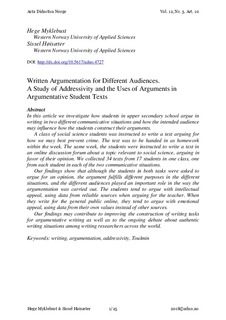| dc.contributor.author | Myklebust, Hege | |
| dc.contributor.author | Høisæter, Sissel M. | |
| dc.date.accessioned | 2018-12-19T09:32:28Z | |
| dc.date.available | 2018-12-19T09:32:28Z | |
| dc.date.created | 2018-12-12T19:14:50Z | |
| dc.date.issued | 2018 | |
| dc.identifier.citation | Myklebust, H., & Høisæter, S. (2018). Written argumentation for different audiences: A study of addressivity and the uses of arguments in argumentative student texts. Acta Didactica Norge, 12(3), 1-25. | nb_NO |
| dc.identifier.issn | 1504-9922 | |
| dc.identifier.uri | http://hdl.handle.net/11250/2578257 | |
| dc.description.abstract | In this article we investigate how students in upper secondary school argue in writing in two different communicative situations and how the intended audience may influence how the students construct their arguments.
A class of social science students was instructed to write a text arguing for how we may best prevent crime. The text was to be handed in as homework within the week. The same week, the students were instructed to write a text in an online discussion forum about a topic relevant to social science, arguing in favor of their opinion. We collected 34 texts from 17 students in one class, one from each student in each of the two communicative situations.
Our findings show that although the students in both tasks were asked to argue for an opinion, the argument fulfills different purposes in the different situations, and the different audiences played an important role in the way the argumentation was carried out. The students tend to argue with intellectual appeal, using data from reliable sources when arguing for the teacher. When they write for the general public online, they tend to argue with emotional appeal, using data from their own values instead of other sources.
Our findings may contribute to improving the construction of writing tasks for argumentative writing as well as to the ongoing debate about authentic writing situations among writing researchers across the world. | nb_NO |
| dc.language.iso | eng | nb_NO |
| dc.rights | Attribution-NonCommercial-NoDerivatives 4.0 Internasjonal | * |
| dc.rights.uri | http://creativecommons.org/licenses/by-nc-nd/4.0/deed.no | * |
| dc.subject | writing | nb_NO |
| dc.subject | argumentation | nb_NO |
| dc.subject | addressivity | nb_NO |
| dc.subject | Toulmin | nb_NO |
| dc.title | Written Argumentation for Different Audiences. A Study of Addressivity and the Uses of Arguments in Argumentative Student Texts | nb_NO |
| dc.type | Journal article | nb_NO |
| dc.type | Peer reviewed | nb_NO |
| dc.description.version | publishedVersion | nb_NO |
| dc.rights.holder | © 2018, The Author(s) | nb_NO |
| dc.subject.nsi | VDP::Samfunnsvitenskap: 200::Pedagogiske fag: 280 | nb_NO |
| dc.source.pagenumber | 1-25 | nb_NO |
| dc.source.volume | 12 | nb_NO |
| dc.source.journal | Acta Didactica Norge - tidsskrift for fagdidaktisk forsknings- og utviklingsarbeid i Norge | nb_NO |
| dc.source.issue | 3 | nb_NO |
| dc.identifier.doi | 10.5617/adno.4727 | |
| dc.identifier.cristin | 1642403 | |
| cristin.unitcode | 203,6,1,0 | |
| cristin.unitname | Avdeling for lærarutdanning og kulturfag - Stord/Haugesund | |
| cristin.ispublished | true | |
| cristin.fulltext | original | |
| cristin.qualitycode | 1 | |

